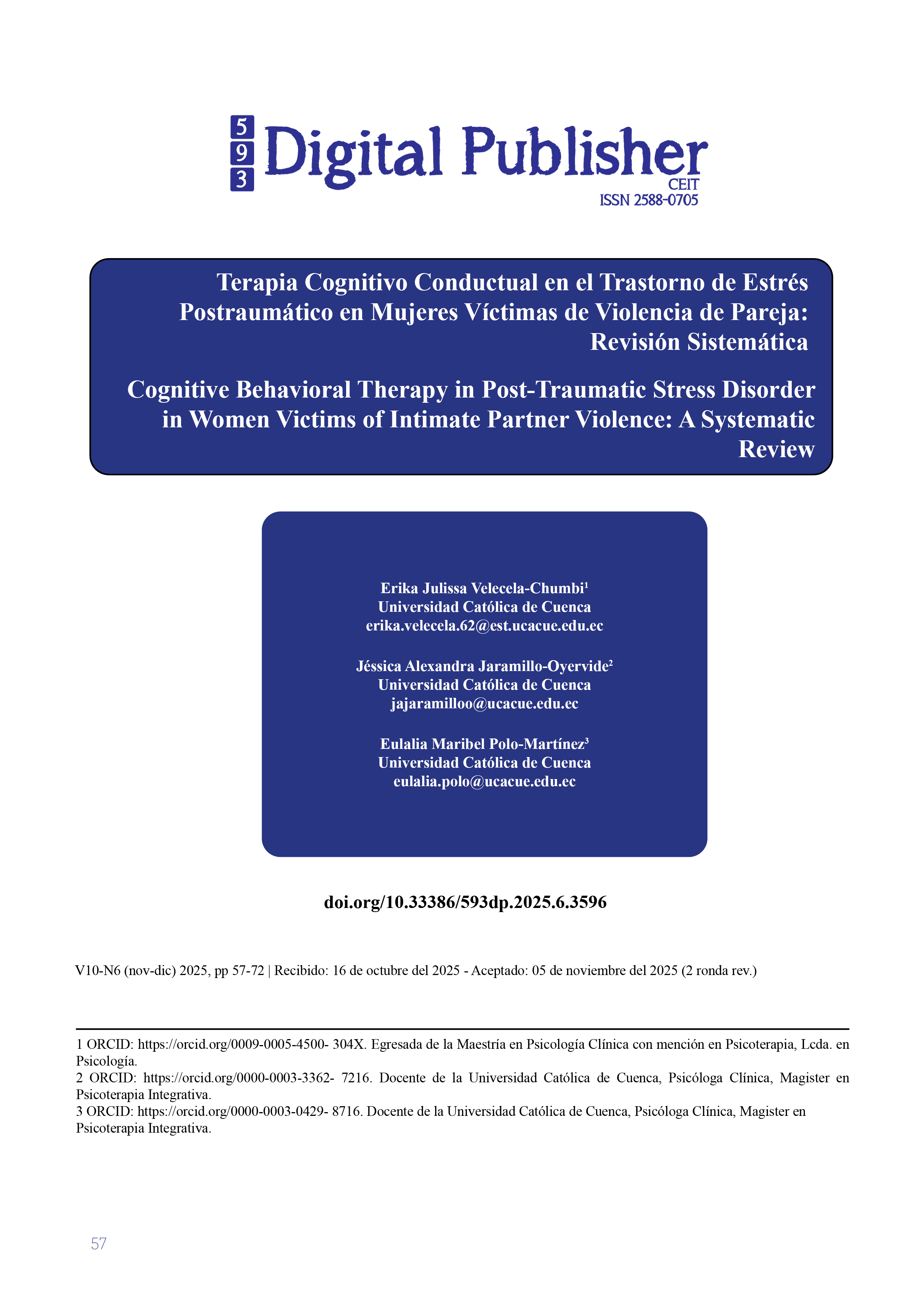Cognitive Behavioral Therapy in Post-Traumatic Stress Disorder in Women Victims of Intimate Partner Violence: A Systematic Review
Main Article Content
Abstract
Post-Traumatic Stress Disorder (PTSD) is a severe psychological condition that significantly impacts the emotional, social, and functional life of individuals, particularly women who are victims of intimate partner violence. This form of violence poses a high risk for the development of PTSD due to constant exposure to traumatic situations. In this context, Cognitive-Behavioral Therapy (CBT) has emerged as an effective option to address trauma-related effects. The objective of this systematic review was to describe the effectiveness of CBT in women who have experienced intimate partner violence and developed PTSD. An extensive search of scientific literature published between 2015 and 2025 was conducted in Scopus, PubMed, ScienceDirect, Cochrane, Scielo, and Dialnet. Randomized controlled trials, quasi-experimental studies, and case studies were considered, following the PRISMA 2020 methodological guidelines. To assess the validity of the studies, CONSORT 2010 and JBI 2020 were applied. Five studies met the quality criteria. Findings showed that both individual and group CBT are effective in reducing PTSD symptoms in intimate partner relationships, as the therapy targets dysfunctional thoughts, strengthens coping skills, and promotes gradual and controlled exposure to traumatic memories. On average, between 60% and 80% of participants demonstrated clinically significant improvement, which was sustained for approximately six months post-intervention. It is concluded that CBT is a recommended intervention for the psychological recovery of women survivors of intimate partner violence.
Downloads
Article Details

This work is licensed under a Creative Commons Attribution-NonCommercial-ShareAlike 4.0 International License.
1. Derechos de autor
Las obras que se publican en 593 Digital Publisher CEIT están sujetas a los siguientes términos:
1.1. 593 Digital Publisher CEIT, conserva los derechos patrimoniales (copyright) de las obras publicadas, favorece y permite la reutilización de las mismas bajo la licencia Licencia Creative Commons 4.0 de Reconocimiento-NoComercial-CompartirIgual 4.0, por lo cual se pueden copiar, usar, difundir, transmitir y exponer públicamente, siempre que:
1.1.a. Se cite la autoría y fuente original de su publicación (revista, editorial, URL).
1.1.b. No se usen para fines comerciales u onerosos.
1.1.c. Se mencione la existencia y especificaciones de esta licencia de uso.
References
Aguiar, J. M. de, D’Oliveira, A. F. P. L., & Schraiber, L. B. (2020). Mudanças históricas na rede intersetorial de serviços voltados à violência contra a mulher – São Paulo, Brasil. Interface - Comunicação, Saúde, Educação, 24. https://doi.org/10.1590/interface.190486
American Psychiatric Association. (2013). Diagnostic and Statistical Manual of Mental Disorders (5th ed.). Arlington, VA: American Psychiatric Publishing.
Benjet, C., Bromet, E., Karam, E. G., Kessler, R. C., McLaughlin, K. A., Ruscio, A. M., ... & Koenen, K. C. (2016). The epidemiology of traumatic event exposure worldwide: Results from the World Mental Health Survey Consortium. Psychological Medicine, 46(2), 327–343. https://doi.org/10.1017/S0033291715001981
Bisson, J. I., Roberts, N. P., Andrew, M., Cooper, R., & Lewis, C. (2016). Psychological therapies for chronic post-traumatic stress disorder (PTSD) in adults: Systematic review and network meta-analysis. The Lancet Psychiatry, 3(5), 456-467. https://doi.org/10.1016/S2215-0366(16)30083-2
Cáceres-Ortiz, Eduin, Labrador-Encinas, Francisco, Ardila-Mantilla, Paola y Parada-Ortiz, Diana. (2011). Tratamiento cognitivo conductual centrado en el trauma de mujeres víctimas de violencia de pareja. Psicología. Avances de la Disciplina, 5 (2), 13-31. http://www.scielo.org.co/scielo.php?script=sci_arttext&pid=S1900-23862011000200002
Comisión Económica para América Latina y el Caribe. (2023). En 2022, al menos 4.050 mujeres fueron víctimas de femicidio o feminicidio en América Latina y el Caribe: CEPAL. https://www.cepal.org/es/comunicados/2022-al-menos-4050-mujeres-fueron-victimas-femicidio-o-feminicidio-america-latina-caribe
Crespo, M., Arinero, M., & Soberón, C. (2021). Analysis of effectiveness of individual and group trauma-focused interventions for female victims of intimate partner violence. International Journal of Environmental Research and Public Health, 18(4), 1–18. https://doi.org/10.3390/ijerph18041952
Crespo, M., Soberón, C., & Gómez, B. (2022). Effect of adding a positive memories’ module in a trauma-focused cognitive-behavioural treatment for female survivors of intimate partner violence: trial protocol. European Journal of Psychotraumatology, 13(1), 2028329. https://doi.org/10.1080/20008198.2022.2028329
Crespo, M., Hernández-Lloreda, M. J., Hornillos, C., Miguel-Álvaro, A., Sánchez-Ferrer, S., & Antón, A. A. (2024). Evocation of positive memories as complement to trauma-focused cognitive-behavioural therapy for intimate partner violence against women. European Journal of Psychotraumatology, 15(1), 2419699. https://doi.org/10.1080/20008066.2024.2419699
Habigzang, L. F., Schneider, J. A., Frizzo, R. P., & De Freitas, C. P. P. (2018). Evaluation of the impact of a Cognitive-Behavioral intervention for women in domestic violence situations in Brazil. Universitas Psychologica, 17(3), 1–11. https://doi.org/10.11144/javeriana.upsy17-3.eicb
Habigzang, L. F., Petersen, M. G. F., y Maciel, L. Z. (2019). Terapia Cognitivo Conductual para mujeres que sufrieron violencia por su pareja íntima: Estudio de casos múltiplos. Ciencias Psicológicas, 13(2), 249–264. https://doi.org/10.22235/cp.v13i2.1882
Hansen, N B., Eriksen, S. B. y Elklit, A. (2014). Efectos de un programa de intervención para mujeres víctimas de violencia de pareja en los síntomas psicológicos y el apoyo social percibido. European Journal of Psychotraumatology, 5(1), 1-10. https://doi.org/10.3402/ejpt.v5.24797
Instituto Nacional de Estadísticas y Censos (2023). Inec y Unfpa analizaron cifras de violencia contra la mujer en el marco del día internacional de la eliminación de la violencia contra la mujer. https://www.ecuadorencifras.gob.ec/institucional/inec-y-unfpa-analizaron-cifras-de-violencia-contra-la-mujer/
Iverson, K. M., Resick, P. A., Suvak, M. K., Walling, S. M., & Taft, C. T. (2016). Intimate partner violence exposure predicts PTSD treatment engagement and outcome among veterans. Journal of Consulting and Clinical Psychology, 84(1), 62–74. https://doi.org/10.1037/ccp0000056
Joanna Briggs Institute. (2020). Checklist for Quasi-Experimental Studies (non-randomized experimental studies). The Joanna Briggs Institute. https://jbi.global/critical-appraisal-tools
Laca Arocena, F. A. M. C. J. C. (2017). Enseñanza e Investigación en Psicología Consejo Nacional para la Enseñanza en. E Investigación En Psicología, 22(1), 66–75. http://www.redalyc.org/articulo.oa?id=29251161006
López, C., García, M., y Pérez, L. (2018). Terapia cognitivo-conductual para el tratamiento del TEPT en mujeres víctimas de violencia doméstica: Un estudio de intervención. Revista Internacional de Psicología Clínica y de la Salud, 18(1), 39-47. https://doi.org/10.1016/j.psic.2017.12.002
Matud, P., Fortes, D., y Medina, L. (2014). Eficacia de un programa de tratamiento psicológico individual para mujeres maltratadas por su pareja. Psychosocial Intervention, 23(3), 199–207. https://doi.org/10.1016/j.psi.2014.06.001
Matud, M. P., Díaz, A., y Bethencourt, J. (2016). Eficacia de un programa de intervención para mujeres maltratadas por su pareja. Psicothema, 28(2), 153-159. http://dx.doi.org/10.4067/S0718-48082016000300004
Mayor Walton, S., y Salazar Pérez, C. A. (2019). La violencia intrafamiliar. Un problema de salud actual. Gaceta Médica Espirituana, 21(1), 96–105. http://scielo.sld.cu/scielo.php?script=sci_arttext&pid=S1608-89212019000100096&lang=es
ONU Mujeres. (2023). Violencia contra mujeres y niñas. Naciones Unidas. https://www.unwomen.org/es/what-we-do/ending-violence-against-women
Orang, T., et al. (2018). The efficacy of narrative exposure therapy in a sample of Iranian women exposed to ongoing intimate partner violence: A randomized controlled trial. Journal of Traumatic Stress, 31(2), 275-284. https://doi.org/10.1002/cpp.2318
Organización Mundial de la Salud. (2021). Violencia contra la mujer. Datos y cifras: https://www.who.int/es/news-room/fact-sheets/detail/violence-against-women
Ouzzani, M., Hammady, H., Fedorowicz, Z., & Elmagarmid, A. (2016). Rayyan—a web and mobile app for systematic reviews. Systematic Reviews, 5(1), 210. https://doi.org/10.1186/s13643-016-0384-4
Page, M. M.-W. (2021). The PRISMA 2020 statement: An updated guideline for reporting systematic reviews. Plos Medicine, 18(3), 1-15. https://doi.org/10.1371/journal.pmed.1003583
Petersen, Mariana Gomes Ferreira, Zamora, Júlia Carvalho, Fermann, Ilana Luiz, Crestani, Pâmela Letícia, & Habigzang, Luísa Fernanda. (2019). Psicoterapia cognitivo-comportamental para mulheres em situação de violência doméstica: revisão sistemática. Psicologia Clínica, 31(1), 145-165. https://doi.org/10.33208/PC1980-5438v0031n01A07
Petrosky, E., Blair, J. M., Betz, C. J., Fowler, K. A., Jack, S. P., & Lyons, B. H. (2017). Racial and ethnic differences in homicides of adult women and the role of intimate partner violence—United States, 2003–2014. Morbidity and Mortality Weekly Report (MMWR), 66(28), 741–746. https://doi.org/10.15585/mmwr.mm6628a1
Rodríguez, C., Arenas, L., y Montero, I. (2017). La violencia de pareja en contextos latinoamericanos: Retos y perspectivas. Revista Latinoamericana de Psicología, 49(1), 41–52. https://doi.org/10.1016/j.rlp.2016.08.001
Schnyder, U., Ehlers, A., Elbert, T., et al. (2015). Psychotherapies for PTSD: What do they have in common? European Journal of Psychotraumatology, 6(1), 28186. https://doi.org/10.3402/ejpt.v6.28186
Schulz, K., Altman, D., Moher, D., & Group, f. t. (2010). CONSORT 2010 Statement: updated guidelines for reporting parallel group randomised trials. BMJ, 340(c332). https://doi.org/10.1136/bmj.c332
Vaca-Ferrer, R., Ferro-García, R., & Valero-Aguayo, L. (2020). Efficacy of a group intervention program with women victims of gender violence in the framework of contextual therapies. Anales de Psicología, 36(2), 189–199. https://doi.org/10.6018/analesps.36.2.396901
Velasco, C. (2020). Violencia contra la mujer: Problemática actual y retos futuros. Revista de Estudios Sociales, 72, 30–45. https://doi.org/10.7440/res72.2020.03
World Health Organization. (2017). Violence against women: Key facts. https://www.who.int/news-room/fact-sheets/detail/violence-against-women
Xue, M., Yu, P., Gu, Z., & Sun, Y. (2025). Online narrative therapy intervention improves post-traumatic stress disorder symptoms, perceived stress, anxiety, and depression in nurses: A randomized controlled trial. Brazilian Journal of Psychiatry, 47. https://doi.org/10.47626/1516-4446-2024-3740




